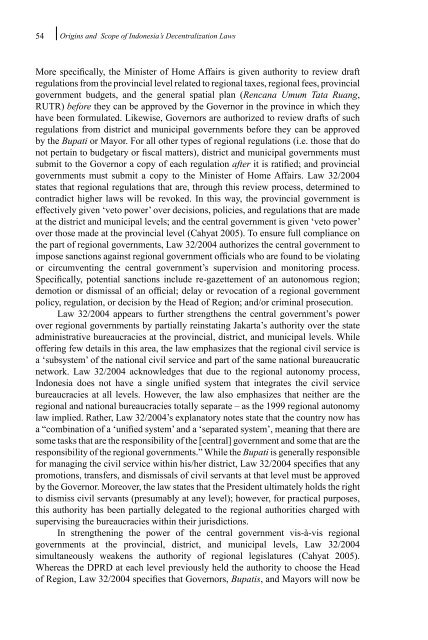Decentralization of Forest Administration in Indonesia, Implications ...
Decentralization of Forest Administration in Indonesia, Implications ...
Decentralization of Forest Administration in Indonesia, Implications ...
Create successful ePaper yourself
Turn your PDF publications into a flip-book with our unique Google optimized e-Paper software.
54<br />
Orig<strong>in</strong>s and Scope <strong>of</strong> <strong>Indonesia</strong>’s <strong>Decentralization</strong> Laws<br />
More specifically, the M<strong>in</strong>ister <strong>of</strong> Home Affairs is given authority to review draft<br />
regulations from the prov<strong>in</strong>cial level related to regional taxes, regional fees, prov<strong>in</strong>cial<br />
government budgets, and the general spatial plan (Rencana Umum Tata Ruang,<br />
RUTR) before they can be approved by the Governor <strong>in</strong> the prov<strong>in</strong>ce <strong>in</strong> which they<br />
have been formulated. Likewise, Governors are authorized to review drafts <strong>of</strong> such<br />
regulations from district and municipal governments before they can be approved<br />
by the Bupati or Mayor. For all other types <strong>of</strong> regional regulations (i.e. those that do<br />
not perta<strong>in</strong> to budgetary or fiscal matters), district and municipal governments must<br />
submit to the Governor a copy <strong>of</strong> each regulation after it is ratified; and prov<strong>in</strong>cial<br />
governments must submit a copy to the M<strong>in</strong>ister <strong>of</strong> Home Affairs. Law 32/2004<br />
states that regional regulations that are, through this review process, determ<strong>in</strong>ed to<br />
contradict higher laws will be revoked. In this way, the prov<strong>in</strong>cial government is<br />
effectively given ‘veto power’ over decisions, policies, and regulations that are made<br />
at the district and municipal levels; and the central government is given ‘veto power’<br />
over those made at the prov<strong>in</strong>cial level (Cahyat 2005). To ensure full compliance on<br />
the part <strong>of</strong> regional governments, Law 32/2004 authorizes the central government to<br />
impose sanctions aga<strong>in</strong>st regional government <strong>of</strong>ficials who are found to be violat<strong>in</strong>g<br />
or circumvent<strong>in</strong>g the central government’s supervision and monitor<strong>in</strong>g process.<br />
Specifically, potential sanctions <strong>in</strong>clude re-gazettement <strong>of</strong> an autonomous region;<br />
demotion or dismissal <strong>of</strong> an <strong>of</strong>ficial; delay or revocation <strong>of</strong> a regional government<br />
policy, regulation, or decision by the Head <strong>of</strong> Region; and/or crim<strong>in</strong>al prosecution.<br />
Law 32/2004 appears to further strengthens the central government’s power<br />
over regional governments by partially re<strong>in</strong>stat<strong>in</strong>g Jakarta’s authority over the state<br />
adm<strong>in</strong>istrative bureaucracies at the prov<strong>in</strong>cial, district, and municipal levels. While<br />
<strong>of</strong>fer<strong>in</strong>g few details <strong>in</strong> this area, the law emphasizes that the regional civil service is<br />
a ‘subsystem’ <strong>of</strong> the national civil service and part <strong>of</strong> the same national bureaucratic<br />
network. Law 32/2004 acknowledges that due to the regional autonomy process,<br />
<strong>Indonesia</strong> does not have a s<strong>in</strong>gle unified system that <strong>in</strong>tegrates the civil service<br />
bureaucracies at all levels. However, the law also emphasizes that neither are the<br />
regional and national bureaucracies totally separate – as the 1999 regional autonomy<br />
law implied. Rather, Law 32/2004’s explanatory notes state that the country now has<br />
a “comb<strong>in</strong>ation <strong>of</strong> a ‘unified system’ and a ‘separated system’, mean<strong>in</strong>g that there are<br />
some tasks that are the responsibility <strong>of</strong> the [central] government and some that are the<br />
responsibility <strong>of</strong> the regional governments.” While the Bupati is generally responsible<br />
for manag<strong>in</strong>g the civil service with<strong>in</strong> his/her district, Law 32/2004 specifies that any<br />
promotions, transfers, and dismissals <strong>of</strong> civil servants at that level must be approved<br />
by the Governor. Moreover, the law states that the President ultimately holds the right<br />
to dismiss civil servants (presumably at any level); however, for practical purposes,<br />
this authority has been partially delegated to the regional authorities charged with<br />
supervis<strong>in</strong>g the bureaucracies with<strong>in</strong> their jurisdictions.<br />
In strengthen<strong>in</strong>g the power <strong>of</strong> the central government vis-à-vis regional<br />
governments at the prov<strong>in</strong>cial, district, and municipal levels, Law 32/2004<br />
simultaneously weakens the authority <strong>of</strong> regional legislatures (Cahyat 2005).<br />
Whereas the DPRD at each level previously held the authority to choose the Head<br />
<strong>of</strong> Region, Law 32/2004 specifies that Governors, Bupatis, and Mayors will now be

















